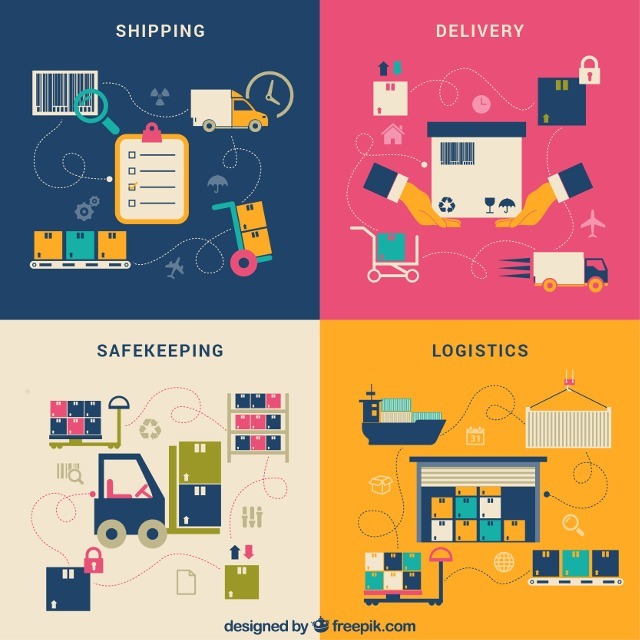Many big companies like Google, Amazon and others will be using blockchain technology. There’s no question it will be found in the future, and will be a game changer in transport and logistics.
There are many issues nowadays in transport and logistics, like transparency; where consumers do not know where their products come from. A product can be inspected by more than 30 organisms while traveling; adding all of this costs a lot of money.
The process is still verified manually by sheets of papers; if one paper is missing, then a whole container, for example, can be delayed and not loaded. The transport can be delayed for several days, and if there is an expiration date on the goods, it can be lost.
A situation that happened in the US West Coast ports in 2015 was a nightmare for all parties involved, due to the slowdown of work. Vessels that usually take about two weeks to arrive from Asia couldn’t discharge for almost a month, and at one point, the average container pick-up time from the terminal was 15 days. This is just one small example of how it becomes more and more challenging to keep on-time delivery rates high; a strike in India, risk of war in the Middle East, piracy in Somalia, and even Chinese New Year are all contributing factors to this problem one way or another.
First of all, what is blockchain?
 Blockchain, invented by Satoshi Nakamoto, is a distributed database technology that holds records of digital information with transparency, security and works without a controlled central organ.
Blockchain, invented by Satoshi Nakamoto, is a distributed database technology that holds records of digital information with transparency, security and works without a controlled central organ.
Originally developed as the accounting method for the virtual currency Bitcoin, the technology is primarily used to verify transactions within digital currencies, code and insert practically any document into the blockchain. Doing so creates an indelible record that cannot be changed. The record’s authenticity can be verified by the entire community using the blockchain, instead of a single centralized authority.
The advantages of blockchain in logistics
Because transaction data on the blocks cannot be altered or forged, the transaction information is very trustworthy. Also, by adopting smart contracts which can automate transactions under certain conditions, you can significantly improve the speed of work. In the logistics sector, where tasks involve a lot of documentation, innovation is happening with this blockchain technology.
In 2016, the Denmark-based shipping giant Maersk Line carried out a blockchain proof of concept, and the carrier expects a 20 percent reduction in transportation costs if the blockchain is used for shipment of goods from East Africa to Europe. Blockchain is not just another new technology, it is expected to play a key role in achieving a steady growth of logistics businesses. Therefore, there needs to be a discussion about what role blockchain technology is going to play in the logistics sector.
 In logistics, numerous parties are involved to perform the tasks of transporting raw materials or products to customers. All transactions in logistics are carried out based on multiple documents to ensure trustworthiness of the transactions. In global trade, work is done based on standard trade documents, whereas in face-to-face exchanges, there are usually no trust issues as the buyer would pay after seeing the product for himself.
In logistics, numerous parties are involved to perform the tasks of transporting raw materials or products to customers. All transactions in logistics are carried out based on multiple documents to ensure trustworthiness of the transactions. In global trade, work is done based on standard trade documents, whereas in face-to-face exchanges, there are usually no trust issues as the buyer would pay after seeing the product for himself.
Because transactions are solely dependent on documents in global trade, the risk is often high, as you’re not sure if the other party will send you the products, or if the importer will make a payment. Plus, in the case of global trade, where documents guaranteeing the quality of products are required, there is a possibility of these documents being altered or forged.
There is also no way of knowing what tasks or processes the other party is working on in real-time, unless you make a call or send an email. However, blockchain technology creates a trusted environment by making sure that transaction information on blocks is resistant to forgery or modification.
In the future, blockchain is expected to bring about a paradigm shift in logistics. It will make the transaction verification process more efficient, and help achieve a quick delivery of goods and services through mutual trust among participants. This process may take several years to be implanted in logistics.
Sources :
https://www.investopedia.com/terms/b/blockchain.asp#ixzz5KvP7KlKR
https://www.logistics.dhl/content/dam/dhl/global/core/documents/pdf/glo-core-blockchain-trend-report.pdf
https://blockchainfrance.net/2017/08/23/blockchain-logistique-et-supply-chain-panorama-des-possibilites/
https://cryptoslate.com/blockchain-technology-shaking-logistics-industry/
https://steemkr.com/blockchain/@beeflowers/blockchain-in-logistics
https://www.samsungsds.com/global/en/enterprise-asset/cello_WP12_en.html
https://www.forbes.com/sites/bernardmarr/2018/03/23/how-blockchain-will-transform-the-supply-chain-and-logistics-industry/#6cc57f9e5fec
http://www.supplychain247.com/article/why_blockchain_is_a_game_changer_for_the_supply_chain
https://www.ibm.com/blockchain/industries/supply-chain
https://hackernoon.com/blockchain-in-supply-and-logistics-2a240e69c522
http://transmetrics.eu/blog/blockchain-in-logistics-will-it-change-the-industry-part-2/
https://medium.com/@Zebidata/blockchain-in-supply-chain-logistics-6cdfe36ffe88
Photo credit: Designed by Freepik; jaydeep_ via pixabay.com
Formation:
Formez vous aux protocoles Blockchain grâce aux formations blockchain à Genève du Swiss Blockchain Institute.


 Blockchain, invented by Satoshi Nakamoto, is a distributed database technology that holds records of digital information with transparency, security and works without a controlled central organ.
Blockchain, invented by Satoshi Nakamoto, is a distributed database technology that holds records of digital information with transparency, security and works without a controlled central organ. In logistics, numerous parties are involved to perform the tasks of transporting raw materials or products to customers. All transactions in logistics are carried out based on multiple documents to ensure trustworthiness of the transactions. In global trade, work is done based on standard trade documents, whereas in face-to-face exchanges, there are usually no trust issues as the buyer would pay after seeing the product for himself.
In logistics, numerous parties are involved to perform the tasks of transporting raw materials or products to customers. All transactions in logistics are carried out based on multiple documents to ensure trustworthiness of the transactions. In global trade, work is done based on standard trade documents, whereas in face-to-face exchanges, there are usually no trust issues as the buyer would pay after seeing the product for himself.


Hi George, thank you for the excellent article. What is remarkable about blockchain is that this technology is used nowadays in vaccine supply and distribution, making the whole process transparent and secure. I believe successful examples of such usage will make many more companies take a closer look at blockchain. Which will result in significant technology development.